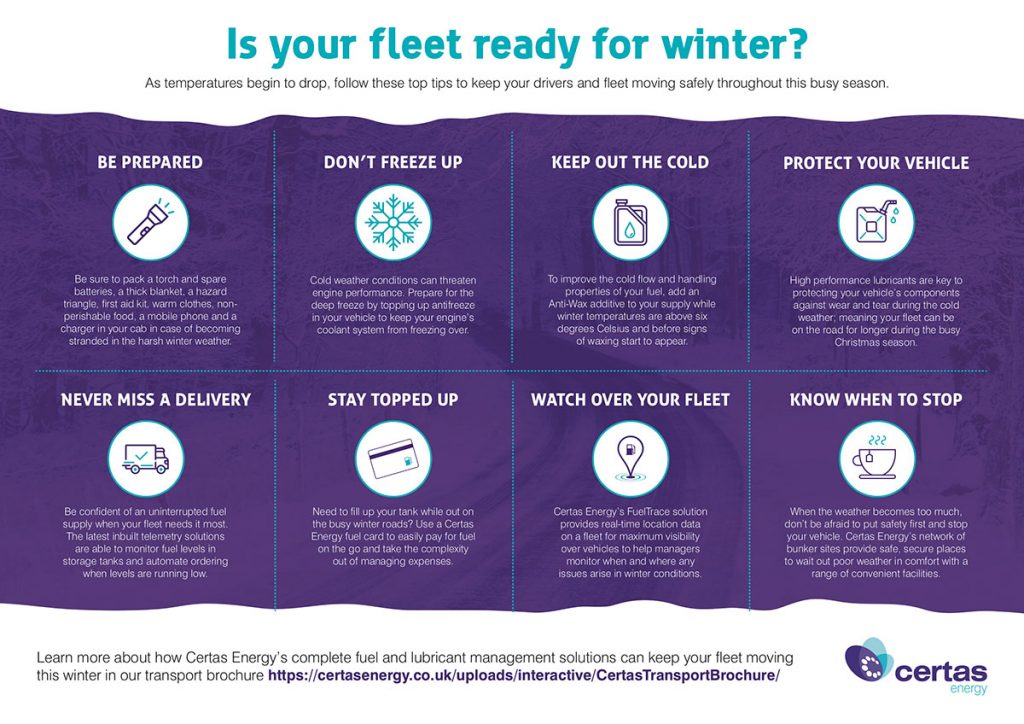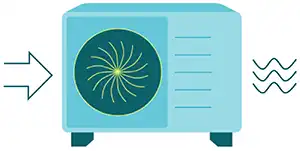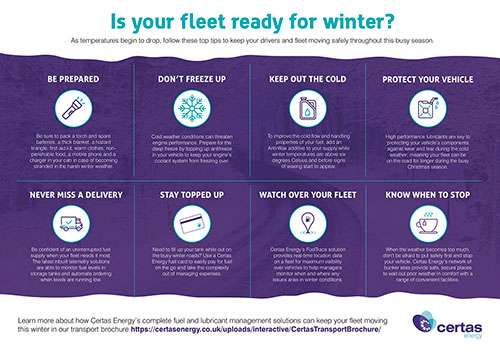
Being on the road all year round, hauliers will be the first to testify how bitterly cold the UK weather can become. But there’s more to winter preparation than warm clothing and a hot thermos. The cold weather can have serious impacts on unprepared fleets – causing fuel issues that can stop your fleet heading out on the roads at all.
Taking precautionary measures can ensure engines run at peak performance in even the coldest conditions. Read on to find out how you can achieve the best fuel flow for your fleet this winter with the right additives, fuel storage and alternative fuels.
Wax On, Wax Off
When the cold weather sets in, fuel can be at risk of forming wax crystals that can clog up fuel lines or even prevent vehicles from starting at all. Adding Anti-Wax additive to a bulk fuel supply allows engine operation at colder temperatures than the original fuel specification by co-crystallising with the fuel wax crystals to change their shape and make them smaller.
Prevention is the best cure when it comes to keeping fuel healthy in winter. To improve the cold flow and handling properties of your fuel, Anti-Wax is best added to a bulk supply when:
1. Temperatures are above 6℃;
2. The forecast is showing temperatures below -5℃;
3. The fuel is above its cloud point. If the fuel is already waxed, the additive will not work – so don’t wait until temperatures drop to introduce it to your supply.
For the most effective application, check that the fuel that’s about to be treated is clear and unclouded. As wax tends to sink once formed, the best way to test this is by taking a sample from the bottom of the tank before introducing the additive. Fuel is typically dosed at the ratio of 1 litre of Anti-Wax additive to 1,000 litres of fuel – with the fuel added on top of the additive to ensure thorough mixing. If treating a full tank of fuel, be sure to mix the fuel and additive with a pump for the best results.
It’s important to note that using additives will not affect manufacturer warranties as they do not change the specification of the fuel. For added piece of mind, it’s best to order additives from a trusted supplier. Anti-Wax additives supplied by Certas Energy do not affect fuel specification.
Best Practice Bulk Fule Storage For Winter
Tank maintenance and servicing play an important part in keeping fuel healthy and fleets moving through winter. Water, sludge and sediment can build up over time in a tank, and during winter these contaminants can freeze – blocking supply and creating wear in fuel systems. That’s why it’s important to check tanks for any signs of sludge and water before temperatures drop. Ideally, businesses should check bulk fuel tanks for water weekly or monthly – depending on the outdoor temperature – to prevent the microbial build up that causes costly corrosion.
Take samples from the top, the middle and the bottom of a tank to check for water, sludge and sediment. Anything that isn’t clean fuel should be removed from the tank immediately through polishing or filtration to prevent future issues. Once the contaminants have been removed, test the fuel again to ensure it is clean, dry and ready to use. If high levels of contaminants are found – arrange for a professional deep clean of the tank by an OFTEC-registered engineer for maximum peace of mind.
Poor tank maintenance can cause disruption no matter what time of year it is. Be sure to check your tank regularly for any signs of wear and tear such as cracks, deformations or weather erosion, as these can cause costly leaks and spillages. If anything seems amiss, call an OFTEC-registered engineer to perform a full inspection. All Certas Energy engineers are OFTEC-registered, and are able to support with every aspect of tank installation, servicing and maintenance – including fuel polishing and tank cleaning. You can find out more by downloading our tanks brochure here.
Busting The Cold Flow Myths Around Alternative Fuels
While most people are aware that one of the key benefits of using alternative fuels is a reduction in emissions, few know of the improved cold start properties offered by certain alternatives such as gas-to-liquid (GTL) fuel.
Paraffinic fuels are widely believed to offer poor cold flow properties due to them containing high levels of normal paraffins (n-paraffins). But this is not always the case.
GTL Fuel is a drop-in, cleaner-burning diesel alternative that consists almost entirely of straight chain n-paraffins and branched iso-paraffins. As well as reducing emissions of harmful pollutants such as nitrogen oxides (NOx) and particulate matter (PM), GTL Fuel is also able to meet the specifications for winter grade fuels in Europe. This is a result of the fuel’s unique production process, which ensures that iso-paraffins predominate over n-paraffins for good cold flow.
Furthermore, as the iso-paraffins in GTL Fuel have limited and short side chains, the fuel has both a high cetane number and good cold flow. Combined with a cold filter plugging point of below -20℃ (when untreated with a cold flow additive), GTL Fuel supports better starting performance for fleets in cold conditions.
It pays to be prepared when the temperature drops. Running a fleet of 900 tankers ourselves, we understand the challenges that winter can bring. That’s why we’re proud to offer everything you need – from AdBlue® and additives to storage and telematics – to keep your fleet on the road.
Want to know more about how we can help keep your fleet moving through winter?







